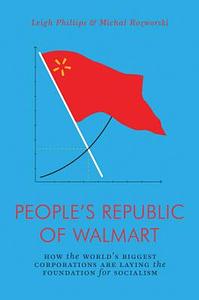Take a photo of a barcode or cover
I find this book difficult to place politcally, I think due the lack of distinction between socialism and a planned economy.
At it's best this book is a refutation of the Hayekian notion that the economy cannot be planned and nor should, mainly by pointing out that planning obvisously happends in firms and that large companies operate across their whole supply chains to keep costs low. It fails, however to to make the next step to show how this lays the foundations of socialism as it claims in it's subtitle.
Phillips, does not go into much detail with how this planning operates or what is distinctive about these large companies, which I personally would have enjoyed . It does say that they use data other than prices and solve problems optimization problems with computer science techniques like linear algebra and machine learning. I don't take this to be socialism. While it does indeed dispell the strict notion that nothing can be plannned, the examples of planning are highly technocratic and require making work robotic and exploitative in order to narrow possibiliy spaces to make planning effective. Phillips broadly says, see planning can happen but we should make it more democratic and less exploitative, without any real sense of what that would mean.
At it's best this book is a refutation of the Hayekian notion that the economy cannot be planned and nor should, mainly by pointing out that planning obvisously happends in firms and that large companies operate across their whole supply chains to keep costs low. It fails, however to to make the next step to show how this lays the foundations of socialism as it claims in it's subtitle.
Phillips, does not go into much detail with how this planning operates or what is distinctive about these large companies, which I personally would have enjoyed . It does say that they use data other than prices and solve problems optimization problems with computer science techniques like linear algebra and machine learning. I don't take this to be socialism. While it does indeed dispell the strict notion that nothing can be plannned, the examples of planning are highly technocratic and require making work robotic and exploitative in order to narrow possibiliy spaces to make planning effective. Phillips broadly says, see planning can happen but we should make it more democratic and less exploitative, without any real sense of what that would mean.
Typical of the left-accelerationist approach. It shares a lot of the same technological and economic assumptions as Inventing the Future by Srnicek and Williams -- which is not a good thing.
funny
informative
medium-paced
I have been looking for a book like this for a long time. Fantastic.
informative
medium-paced
challenging
informative
medium-paced
Comrades! We must not only seize the means of production but also of distribution. This book doesn't tell us how but lays out a good argument as to why.
A pretty good introduction into the history of economic planning. The authors do a pretty good job of introducing the ideas, along with their critique's and critique's of the critique's. A few of the sections are a little confusing and roundabout, but most of the chapters have solid conclusions that bring most of the ideas together. Unfortunately, it leaves a little to be desired in terms of case studies, but there are a few works mentioned in the book that are for the more depth inclined. Personally, I think they should have had a section that outlined these works in a more succinct manner, that intros each of them (outside of the respective chapters where they used to push the theory the book proposes).
Heavy emphasis on democratization of the economy and the critiques of current planning methods are fairly cogent. I wish there was a little more, but it works pretty strongly as a launching point for those who want to know more, which I certainly do.
Heavy emphasis on democratization of the economy and the critiques of current planning methods are fairly cogent. I wish there was a little more, but it works pretty strongly as a launching point for those who want to know more, which I certainly do.






